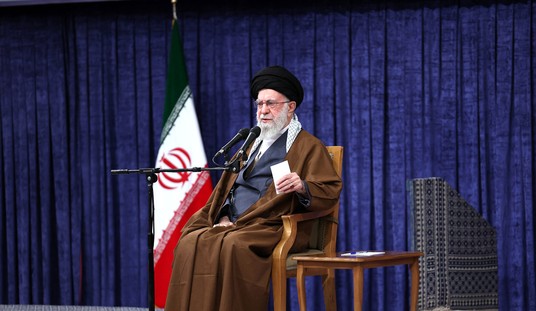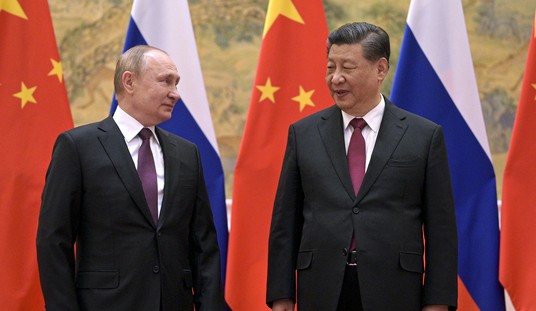Tony Blair was a showman to the last, with his resignation announcement delivered in front of an adoring audience in Trimdon Labour Club, declaring of his service as Prime Minister, “I did what I thought was right.”
Outside, in the sunshine, amid the media circus and the phalanxes of yellow-jacketed police, there was a voluble section that disagreed, blasting off air horns with monotonous regularity. Those were the anti-war demonstrators, protesting about what will, without doubt, be the single most important issue which defines the Blair legacy: Iraq.
Perversely, this means his legacy is essentially in other peoples’ hands, since the Iraqi war is, if nothing else, unfinished business. How Blair goes down in the history books depends, to a great extent, on whether the outcome in Iraq is successful or whether it degrades into an insoluble morass. And that depends on President Bush and Blair’s own successor, that political enigma known as Gordon Brown, currently the Chancellor of the Exchequer.
Thus it is that Blair will be remembered for three things: Iraq, Iraq, and Iraq.
Contrary to what often seems the vast sweep of public opinion, Blair was right to stand alongside the USA in the wake of 9/11 and to put the weight of the British Armed Forces behind the invasion of Iraq.
If he made a mistake, it was his decision to justify the invasion within the convoluted and restrictive framework of international law. He was side-tracked by the question of Iraq’s possession of weapons of mass destruction, which dominated his case in an attempt to seek international approval through the EU and later the United Nations and to
Instead he could have – and should have – made the case that it was in the national interest to stand alongside the USA to depose an evil dictator in an area of the world which has become the crucible of terrorism and instability. That, at least, would have absolved him from the oft-repeated charge of waging an “illegal” war on the basis of lies.
A simple assertion of an essential principle of nationhood, that every nation has the sovereign right to wage war without higher authorization, would have done much to have pre-empted the assertion that so much dominates the contemporary arguments. There may be wars which are “right” – usually as defined by the victors – or “wrong”. They may be morally justified, or not. But there is no such thing as an “illegal” war.
It says much of Blair that, in the final analysis, he thought he was right and, whatever criticisms may be levied at him, there’s no doubt that he was sincere in believing that the invasion of Iraq was just and necessary.
What is less well-recognized is that Iraq was also the turning point in Blair’s love affair with the European Union. On his election in 1997, this was the man who wanted to be “at the heart of Europe”. Unable – largely because of Gordon Brown’s resistance – to take Britain into the single currency, he instead offered one of the most prized and respected possession of the British nation on the altar of European integration: its armed forces.
Thus, in St. Malo in 1999 he committed the UK into working with the European Union to build a “European Defense Identity”, culminating the following year in an agreement to establish a European Rapid Reaction Force (ERRF) which would have absorbed the bulk of British assets, in terms of manpower and mat√©riel for years to come.
The watershed came with the run-up to the Iraqi invasion, when Blair experienced first-hand the duplicity of Chirac, attempting to lodge resolutions with the United Nations without even consulting his senior partner. This was one of the many events which soured Blair’s European dream.
Then, as the Iraqi adventure progressed, the exigencies of real war increasingly pushed defense policy into a more trans-Atlantic direction as the British army had to restructure and re-equip to deal with a real enemy on the ground. This meant giving less and less attention to the demands of the European Rapid Reaction Force.
Decisions taken in the early 2000s under the tutelage of an arch-Europhile defence minister, Geoffrey Hoon, took time to come through the system (especially procurement decisions required to meet ERRF specifications, with their long lead time), giving the impression of a continued, Euro-centric policy. But it has gradually emerged that Britain had, by and large, resumed its semi-detached relationship with Europe by then. With its focus on the real demands of dealing with the global war on terror, rather than European political integration, the UK broke out of the claustrophobia of the “little European” mentality and is once again a serious actor on the world stage.
Perversely, that achievement is rarely acknowledged within the country – lending credence to the old saw that a prophet is rarely honored in his own land. Many seem to find comfort in the idea that Britain’s international image has been tarnished.
But the truth is that Britain’s credibility with its greatest and most steadfast ally – and the world’s only remaining superpower, the US – has never been greater, and co-operation with other nations in the global war on terror has brought new allies, and strengthened ties with old ones, not least in the countries of “new” Europe of the enlarged European Union.
It is indeed perverse that a man who for better or worse has spent the ten years of his tenure as prime minister in the search for peace in many quarters of the world -just think Kosovo or Sierra Leone- is branded a warmonger. At least in that he has something in common with Winston Churchill.
Where he has definitely achieved peace – building on the work of his conservative predecessor, John Major – is in Northern Ireland. Whatever the deals, whatever the compromises, and whatever some people call the “sell-outs”, the fact is in that benighted province, where there were once bombs and bullets there is now peace and a growing prosperity. Old enemies sit together in Stormont as equal partners in government.
It’s not Blair’s job to achieve the same miracle in Iraq, but it is germane to note that it took 40 years to bring peace and stability to Northen Ireland. We’re only six years into the Iraqi adventure, and by that measure it will not be Blair’s immediate successor, or the one after that, who will reap the dividend of the chain of events that Blair helped initiate.
It may be forty years, or even more, before the true effect of Blair’s actions may be properly assessed. Should we or our own successors be the happy benefactors of peace and stability in that troubled part of the world, the Middle East, historians may then need to look back to 2003 and the determination of one man, Tony Blair, in order to write the last line of his legacy.”
Richard North is former director of reseach for a political group in the European Parliament and now freelance political researcher and analyst. He’s also co-editor of the award-winning EUReferendum website.









Join the conversation as a VIP Member